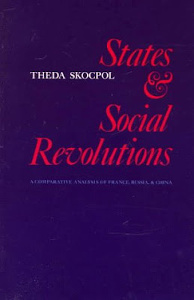Related Research Articles
In political science, a revolution is a rapid, fundamental transformation of a society's class, state, ethnic or religious structures. According to sociologist Jack Goldstone, all revolutions contain "a common set of elements at their core: (a) efforts to change the political regime that draw on a competing vision of a just order, (b) a notable degree of informal or formal mass mobilization, and (c) efforts to force change through noninstitutionalized actions such as mass demonstrations, protests, strikes, or violence."
Jewish fundamentalism refers to fundamentalism in the context of Judaism. The term fundamentalism was originally used in reference to Christian fundamentalism, a Protestant movement which emphasizes a belief in biblical literalism. Today, it is commonly used in reference to movements that oppose modernist, liberal, and ecumenical tendencies within societies as well as modernist, liberal and ecumenical tendencies within specific religions and it is often coupled with extremist ideologies and/or political movements. The use of this definition is important in a Jewish context because the two movements which are most commonly associated with Jewish fundamentalism, Religious Zionism and Haredi Judaism, stray far from biblical literalism due to the importance of the Oral Law within Judaism. In fact, Karaism, the Jewish movement which is well-known due to its emphasis on biblical literalism, is rarely considered fundamentalist.

A social movement is a loosely organized effort by a large group of people to achieve a particular goal, typically a social or political one. This may be to carry out a social change, or to resist or undo one. It is a type of group action and may involve individuals, organizations, or both. Social movements have been described as "organizational structures and strategies that may empower oppressed populations to mount effective challenges and resist the more powerful and advantaged elites". They represent a method of social change from the bottom within nations. On the other hand, some social movements do not aim to make society more egalitarian, but to maintain or amplify existing power relationships. For example, scholars have described fascism as a social movement.
Reinhard Bendix was a German-American sociologist.

Comparative politics is a field in Political Science characterized either by the use of the comparative method or other empirical methods to explore politics both within and between countries. Substantively, this can include questions relating to political institutions, political behavior, conflict, and the causes and consequences of economic development. When applied to specific fields of study, Comparative Politics may be referred to by other names, such as comparative government.

Theda Skocpol is an American sociologist and political scientist, who is currently the Victor S. Thomas Professor of Government and Sociology at Harvard University. She is best known as an advocate of the historical-institutional and comparative approaches, as well as her "state autonomy theory". She has written widely for both popular and academic audiences. She has been President of the American Political Science Association and the Social Science History Association.

States and Social Revolutions: A Comparative Analysis of France, Russia and China is a 1979 book by Theda Skocpol, published by Cambridge University Press, that examines the causes of social revolutions.
Contentious politics is the use of disruptive techniques to make a political point, or to change government policy. Examples of such techniques are actions that disturb the normal activities of society such as demonstrations, general strike action, direct action, riot, terrorism, civil disobedience, and even revolution or insurrection. Social movements often engage in contentious politics. The concept distinguishes these forms of contention from the everyday acts of resistance explored by James C. Scott, interstate warfare, and forms of contention employed entirely within institutional settings, such as elections or sports. Historical sociologist Charles Tilly defines contentious politics as "interactions in which actors make claims bearing on someone else's interest, in which governments appear either as targets, initiators of claims, or third parties."

Social movement theory is an interdisciplinary study within the social sciences that generally seeks to explain why social mobilization occurs, the forms under which it manifests, as well as potential social, cultural, political, and economic consequences, such as the creation and functioning of social movements.
Mayer Nathan Zald was an American sociologist. He was a professor of sociology, social work and business administration at the University of Michigan, noted for contributions to the sociology of organizations and social movements.
Kim Voss is a professor of sociology at the University of California, Berkeley whose main field of research is social movements and the American labor movement.
William Anthony Gamson was a professor of Sociology at Boston College, where he was also the co-director of the Media Research and Action Project (MRAP). He is the author of numerous books and articles on political discourse, the mass-media and social movements from as early as the 1960s. His influential works include Power and Discontent (1968), The Strategy of Social Protest (1975), Encounters with Unjust Authority (1982) and Talking Politics (2002), as well as numerous editions of SIMSOC.

Historical sociology is an interdisciplinary field of research that combines sociological and historical methods to understand the past, how societies have developed over time, and the impact this has on the present. It emphasises a mutual line of inquiry of the past and present to understand how discrete historical events fit into wider societal progress and ongoing dilemmas through complementary comparative analysis.
Evelyn Seiko Nakano Glenn is a professor at the University of California, Berkeley. In addition to her teaching and research responsibilities, she served as founding director of the university's Center for Race and Gender (CRG), a leading U.S. academic center for the study of intersectionality among gender, race and class social groups and institutions. In June 2008, Glenn was elected president of the 15,000-member American Sociological Association. She served as president-elect during the 2008–2009 academic year, assumed her presidency at the annual ASA national convention in San Francisco in August 2009, served as president of the association during the 2009–2010 year, and continued to serve on the ASA governing council as past-president until August 2011. Her presidential address, given at the 2010 meetings in Atlanta, was entitled "Constructing Citizenship: Exclusion, Subordination, and Resistance", and was printed as the lead article in the American Sociological Review.
Far-left politics, also known as extreme left politics or left-wing extremism, are politics further to the left on the left–right political spectrum than the standard political left. The term does not have a single, coherent definition; some scholars consider it to be the left of communist parties, while others broaden it to include the left of social democracy. In certain instances—especially in the news media—far left has been associated with some forms of authoritarianism, anarchism, communism, and Marxism, or are characterized as groups that advocate for revolutionary socialism and related communist ideologies, or anti-capitalism and anti-globalization. Far-left terrorism consists of extremist, militant, or insurgent groups that attempt to realize their ideals through political violence rather than using democratic processes.
A social movement organization (SMO) is an organized component of a social movement.
Lorne L. Dawson is a Canadian scholar of the sociology of religion who has written about new religious movements, the brainwashing controversy, and religion and the Internet. His work is now focused on religious terrorism and the process of radicalization, especially with regard to domestic terrorists.
James Macdonald Jasper is a writer and sociologist who has taught Ph.D. students at the Graduate Center of the City University of New York since 2007. He is best known for his research and theories about culture and politics, especially the cultural and emotional dimensions of protest movements.

A revolutionary movement is a specific type of social movement dedicated to carrying out a revolution. Charles Tilly defines it as "a social movement advancing exclusive competing claims to control of the state, or some segment of it". Jeff Goodwin and James M. Jasper define it more simply as "a social movement that seeks, as minimum, to overthrow the government or state".

Activism consists of efforts to promote, impede, direct or intervene in social, political, economic or environmental reform with the desire to make changes in society toward a perceived common good. Forms of activism range from mandate building in a community, petitioning elected officials, running or contributing to a political campaign, preferential patronage of businesses, and demonstrative forms of activism like rallies, street marches, strikes, sit-ins, or hunger strikes.
References
- 1 2 3 4 "Jeff Goodwin". New York University College of Arts & Science .
- ↑ "Jeff Goodwin". Catalyst Journal. 26 December 2023.
- ↑ Schwartz, Michael (March 2002). "No Other Way Out: States and Revolutionary Movements, 1945–1991 . By Jeff Goodwin. New York: Cambridge University Press, 2001. Pp. xvii + 407". American Journal of Sociology. 107 (5): 1347–1349. doi:10.1086/343133.
- ↑ Goodwin, Jeff (2001). No Other Way Out: States and Revolutionary Movements, 1945–1991. Cambridge University Press. doi:10.1017/CBO9780511812125. ISBN 978-0-521-62948-5.
- ↑ "Jeff Goodwin". University of Chicago Press .
- ↑ "Section Award". American Sociological Association .
- ↑ Beinart, Peter (14 October 2023). "There Is a Jewish Hope for Palestinian Liberation. It Must Survive". The New York Times .
- ↑ "2,000+ Academics Condemn Israel's Attacks on Gaza's Educational Infrastructure". The Wire (India) .
- ↑ Rep. Ackerman attacks over 100 NYU professors for signing divestment letter Archived 2016-04-10 at the Wayback Machine , Posted on Wedivest.org, October 21, 2011.
- ↑ Weinberg, Justin (7 May 2024). "NYU Philosophy Graduate Students Call for Divestment". Daily Nous .
- ↑ Beinart, Peter. "There Is a Jewish Hope for Palestinian Liberation. It Must Survive". Nytimes.
- ↑ "Social Movements in Times of Austerity - Polity Books". www.politybooks.com.
- ↑ "Jeff Goodwin". as.nyu.edu.
- ↑ "Comparative and Historical Sociology Award Recipient History". Asanet.